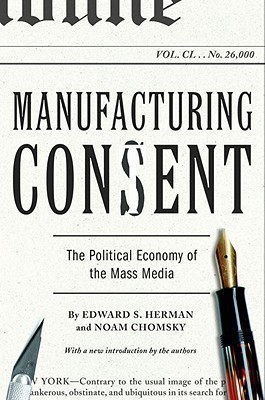More on this book
Community
Kindle Notes & Highlights
Started reading
December 11, 2021
the media serve, and propagandize on behalf of, the powerful societal interests that control and finance them. The representatives of these interests have important agendas and principles that they want to advance, and they are well positioned to shape and constrain media policy. This is normally not accomplished by crude intervention, but by the selection of right-thinking personnel and by the editors’ and working journalists’ internalization of priorities and definitions of newsworthiness that conform to the institution’s policy. Structural factors are those such as ownership and control,
...more
assure some dissent and coverage of inconvenient facts.2 The beauty of the system, however, is that such dissent and inconvenient information are kept within bounds and at the margins, so that while their presence shows that the system is not monolithic, they are not large enough to interfere unduly with the domination of the official agenda.
There are, by one count, 20,000 more public relations agents working to doctor the news today than there are journalists writing it.
The steady advance, and cultural power, of marketing and advertising has caused “the displacement of a political public sphere by a depoliticized consumer culture.”21 And it has had the effect of creating a world of virtual communities built by advertisers and based on demographics and taste differences of consumers. These consumption- and style-based clusters are at odds with physical communities that share a social life and common concerns and which participate in a democratic order.22 These virtual communities are organized to buy and sell goods, not to create or service a public sphere.
entertainment has the merit not only of being better suited to helping sell goods; it is an effective vehicle for hidden ideological messages.24 Furthermore, in a system of high and growing inequality, entertainment is the contemporary equivalent of the Roman “games of the circus” that diverts the public from politics and generates a political apathy that is helpful to preservation of the status quo.
There is little reason to believe that they would not like to understand why they are working harder with stagnant or declining incomes, have inadequate medical care at high costs, and what is being done in their name all over the world. If they are not getting much information on these topics, the propaganda model can explain why: the sovereigns who control the media choose not to offer such material.
With 58,000 killed, the U.S. death toll from the war was under one-tenth of 1 percent of its population; Vietnam’s death toll was 17 percent of its population, and only Vietnam’s people were attacked by chemical warfare and had their countryside devastated.
In 1961 and 1962 the Kennedy administration authorized the use of chemicals to destroy rice crops in South Vietnam—in violation of a U.S. tradition as well as international law (Admiral William Leahy, in response to a proposal to destroy Japanese rice crops in 1944, stated that this would “violate every Christian ethic I have ever heard of and all known laws of war”).
In his book Golden Rule, political scientist Thomas Ferguson argues that where the major investors in political parties and elections agree on an issue, the parties will not compete on that issue, no matter how strongly the public might want an alternative. He contends that for ordinary voters to influence electoral choices they would have to have “strong channels that directly facilitate mass deliberation and expression.”101 These would include unions and other intermediate organizations that might, through their collective power, cause the interests of ordinary voters to be given greater
...more
In successfully avoiding application of the precautionary principle, industry spokespersons have argued that the existing system is based on “sound science.” But science does not tell us that industry has any right to put chemicals into the environment that have any risk at all, let alone telling us what risks are acceptable—these are political decisions.
Along with trying to contain and reverse the growing centralization of the mainstream media, grassroots movements and intermediate groups that represent large numbers of ordinary citizens should put much more energy and money into creating and supporting their own media—as
the “naturalness” of these processes, with inconvenient facts allowed sparingly and within the proper framework of assumptions, and fundamental dissent virtually excluded from the mass media (but permitted in a marginalized press), makes for a propaganda system that is far more credible and effective in putting over a patriotic agenda than one with official censorship.
The essential ingredients of our propaganda model, or set of news “filters,” fall under the following headings: (1) the size, concentrated ownership, owner wealth, and profit orientation of the dominant mass-media firms; (2) advertising as the primary income source of the mass media; (3) the reliance of the media on information provided by government, business, and “experts” funded and approved by these primary sources and agents of power; (4) “flak” as a means of disciplining the media; and (5) “anticommunism” as a national religion and control mechanism.
commercial-television drama “deals almost wholly with the here and now, as processed via advertising budgets,” but on public television, culture “has come to mean ‘other cultures.’ … American civilization, here and now, is excluded from consideration.”


